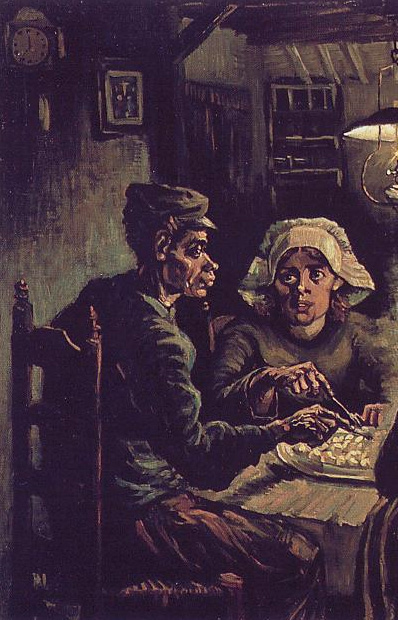To those who are still skeptical that today’s suicidal ethos throughout the West is related to the deranged altruism in the gospels let me remind them that, between 1879 and 1880, in the miserable industrial district of Borinage in Belgium, Vincent van Gogh, apparently imitating Jesus and St Francis, lived a kind of primitive and communal Christian life; gave his clothes to the poor sharing with them the food and even made their beds: all of which undermined his health to such an extent that he never again recovered completely.
Staggering and with mental health issues, in 1883 he returned to test this doctrine of charity. In The Hague, where he engaged at the time the study of art, brother Vincent took a sick prostitute to live with him with one of her five children; then the woman became pregnant again by one of her clients. Brother Vincent took care of her, paid the medical expenses, shared his food and hunger, and wanted to make the prostitute his wife…
Why should we wonder when this “imitation of Christ” reaches levels of insanity such as bringing masses of non-white immigrants into our homelands (see e.g., my Christmas post)?

5 replies on “Brother Vincent”
I just listened to the audiobook of the Pierce biography “The Fame of a Dead Man’s Deeds” on the informative website The End of Zion. (link)
Therein is a chapter on William Gayley Simpson. He had taken a similar path of deranged altruism in his youth. But he overcame Christianity, found Nietzsche, and wrote the great book “Which Way Western Man?”
Simpson was so far into Christianity that he didn’t even wear shoes for years.
What a bizarre cult. Glad you like the site (The End of Zion).
Thank you for your website, very well done.
Joseph Atwill and his “Caesar’s Messiah” blames the creation of Christianity on the Roman imperial family that gave us Vespasian (later emperor) who conquered Judea for Rome.
The Romans created Christianity, a religion of passivity—give unto Caesar what is Caesar’s, and all that—for the conquered Jews of Judea so that they would stop their rebellions, and it only partially worked on the Jews, but had greater success later on with much of Rome and beyond.
The basic hypothesis is sound, but his version is weak.
Some of the essential facts:
1) Emperor Vespasian proudly adopted Josephus as a son.
2) Josephus was a rebel Pharisee historian who ingratiated himself with the emperor’s family.
3) Josephus was a consummate liar capable of forging Gospels.
4) Pro-Roman Jewish queen Bernice was a mistress to Vespasian’s son and successor Titus.
5) “Paul” was a Roman citizen and claimed to have favor with very high level contacts in Roman circles.
6) The quantity and quality of early New Testament manuscripts is consistent with having state support.
7) The Gospels are so full of curious errors and inconsistencies that it is clear they were either invented as an elaborate practical joke (Atwill), or stitched together by myth collectors.